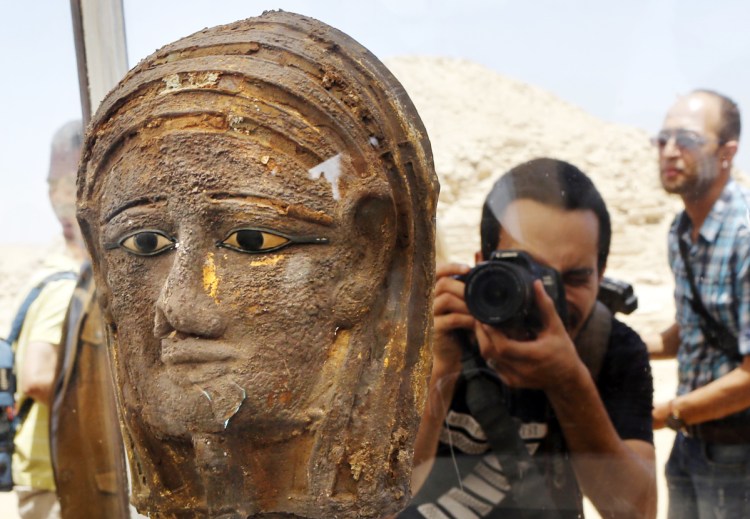CAIRO — Archaeologists in Egypt stumbled upon a new discovery dating back more than 2,500 years near Egypt’s famed pyramids at an ancient necropolis south of Cairo.
The discovery, which includes a mummification workshop and a shaft used as a communal burial place, is located at the Saqqara necropolis of Memphis, the first capital of ancient Egypt. Memphis, a UNESCO World Heritage Site, and its vast necropolis are home to a wide range of temples and tombs as well as the three renowned Giza pyramids.
The latest find, announced at a news conference Saturday, belongs to the Saite-Persian Period, from 664-404 B.C. The site, which lies south of the Unas pyramid, was last excavated more than 100 years ago, in 1900.
In the mummification workshop, an embalmer’s cachette holding a large collection of pottery vessels, bowls and measuring cups were found. Archaeologists believe the findings will reveal more about the oils used in the mummification process in the 26th Dynasty.
“We are in front of a gold mine of information about the chemical composition of these oils,” said Ramadan Hussein, the head of the German-Egyptian mission.
Among the artifacts found were fragments of mummy cartonnages, canopic cylindrical jars and marl clay and faience cups. Many will be displayed in the under-construction Grand Egyptian Museum, the first phase of which is expected to be inaugurated later this year.
Archaeologists also found a silver mask on the face of a mummy in a badly-damaged wooden coffin. The mask, the first to be discovered since 1939, belongs to a priest.
“The finding of this mask could be called a sensation,” Hussein said. “Very few masks of precious metals have been preserved to the present day, because the tombs of most ancient Egyptian dignitaries were looted in ancient times.”
Down the shaft is a host of burial chambers carved into the bedrock lining the sides of two hallways. There lie several mummies, wooden coffins and sarcophagi.
“It’s only the beginning,” added Antiquities Minister Khaled al-Anani. He told reporters that the sites will likely yield more discoveries after further excavation.
Egypt has gone to great lengths to revive its vital tourism industry, still reeling from the political turmoil that followed the 2011 popular uprising.
The Antiquities Ministry has boosted discoveries in recent years in the hopes of bolstering tourism, a major pillar of foreign currency.
Copy the Story LinkSend questions/comments to the editors.



Success. Please wait for the page to reload. If the page does not reload within 5 seconds, please refresh the page.
Enter your email and password to access comments.
Hi, to comment on stories you must . This profile is in addition to your subscription and website login.
Already have a commenting profile? .
Invalid username/password.
Please check your email to confirm and complete your registration.
Only subscribers are eligible to post comments. Please subscribe or login first for digital access. Here’s why.
Use the form below to reset your password. When you've submitted your account email, we will send an email with a reset code.